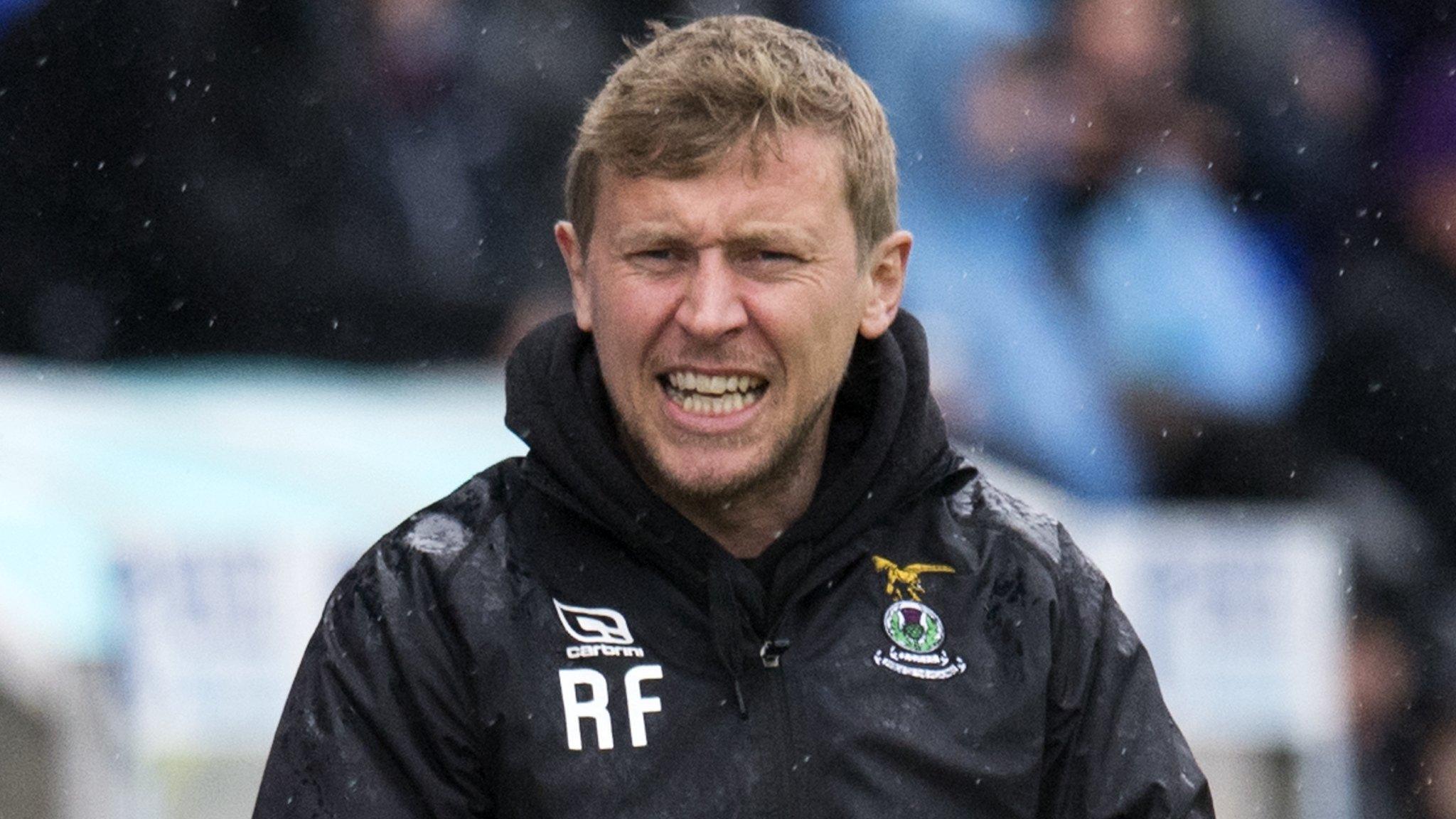1982 European Under-18 Championship: When Scotland's kids conquered Europe
- Published
- comments
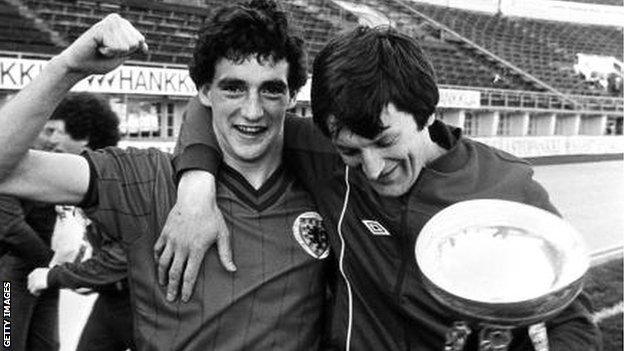
Paul McStay celebrates with Andy Roxburgh following Scotland's victory at the 1982 under-18 European Championships
When next summer rolls around it will be 20 years since Scotland's last participation in a major tournament and, barring an upsurge in fortunes in World Cup qualifying, that wait is likely to continue.
For some, the memories of the France '98 World Cup remain vivid.
But there is now a generation of Scotland fans who fear they may never see their team appear on one of international football's greatest stages.
One of the contributing factors has been the steady decline in the production of young Scottish talent. There was a time when Scotland's kids could not just mix it with the top countries, but beat them.
It was 35 years ago that Scotland won the Uefa European Under-18 Championship, the country's only piece of major international silverware at any level.
"Scotland at that stage were always quite competitive in the under-age national teams," said Andy Roxburgh, who coached the side at the tournament in Finland in 1982, with Walter Smith as his assistant.
"I don't think we went there thinking, 'we're going to win the trophy'. This was to expose the players to international competition."
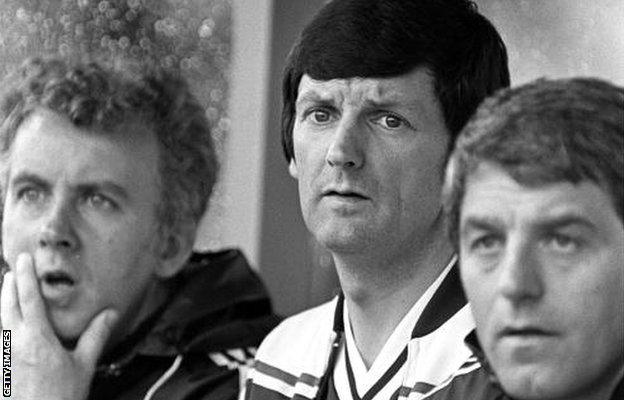
Walter Smith (right) was Andy Roxburgh's assistant with the Scotland under-18 side
Roxburgh may not have had ideas of lifting the trophy, but despite being without Aberdeen's Neale Cooper and Eric Black, the likes of Gary Mackay, Dave Bowman, Paul McStay and Pat Nevin ensured the squad was not short on quality.
"I said I couldn't go because my finals [exams] were at roughly the same time," said Nevin, who was playing for Craig Brown's Clyde at the time.
"Then we worked out that if we got to the final - which we probably wouldn't - my first exam was the next morning. So I said, 'It'll probably be ok, we'll never reach the final'."
'Walter told me we had no chance against the Dutch'
Any raised expectations following wins over Albania and Turkey were tempered by the identity of Scotland's final group opponents.
"I sent Walter Smith to watch Holland in their second match so we knew what we were facing," Roxburgh said.
"When Walter came back he said: 'We've no chance.'
"They had Marco van Basten up front and we all know what happened with him.
"We thought there's only one thing for it - usual Scottish mentality, we'll just have to fight. We go a goal down but we fight back in a positive way, we equalised and in fact we finished really strongly.
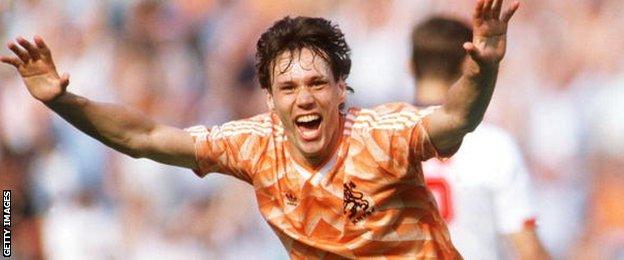
Marco van Basten scored against Scotland at the U18 Euros in 1982 and would later help Holland to the title at Euro '88
"We only needed a draw and on we went."
A 1-1 draw with the Dutch was followed by a 2-0 win over Poland that took the Scots into the final against Czechoslovakia.
"It was a really difficult game," said Nevin. "I can't remember the other goals but I remember mine.
"We had a free-kick outside the box and the idea was someone was to pass to someone else who was to lay it off for someone else to shoot. The lads got utterly confused by it.
"The ball landed at my feet with four defenders just sprinting straight at me. I dribbled through and put the ball away to score. Anybody watching would have thought it was a technically organised piece of football but it was nothing of the sort."
Goals from John Philliben and Gary Mackay either side of Nevin's strike earned Scotland a 3-1 win and the title of under-18 champions of Europe.
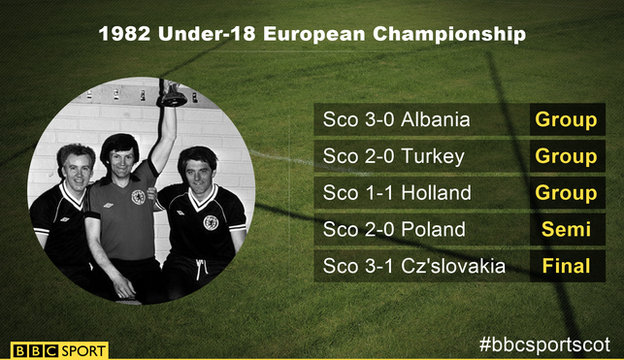
"It got massive publicity back here in Scotland," said Nevin, who was named player of the tournament.
"We knew nothing about the buzz back home. I probably should have told my girlfriend I was going. I told her I was away studying and there I am on the back page of the papers.
"We had a lot of right good players. It was damned obvious that Paul McStay was going to make it and do well."
Fresh from defeating Europe's finest, the Scots geared up for a tilt at a global title the following year.
"This team, having won the Euros, then went to Mexico for the youth World Cup," said Roxburgh who, as manager, led the senior international team to qualification for the 1990 World Cup in Italy and the 1992 European Championship in Sweden.
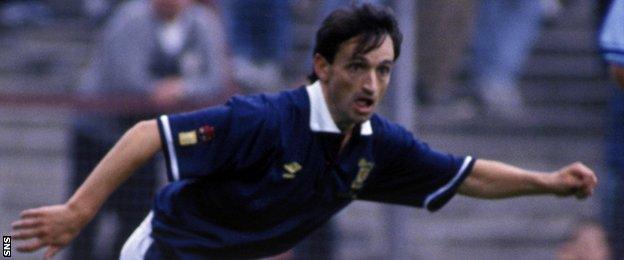
Pat Nevin would go on to earn 27 caps for Scotland
"We had all our players back and we added the likes of Steve Clarke and Brian McClair.
"We play in front of 87,000 in the decisive group match against Mexico and win 1-0. Stevie Clarke scored the only goal and he told me much later on, 'That was the night I realised I could be a top professional player'.
"A large number of the group, in fact more than you would normally get, went on to have top professional careers and played for the national team. That to me was the success," added Roxburgh, whose side lost 1-0 to Poland in the quarter-finals in '83.
'He was very gifted' - the Scot signed by Cruyff
One player from the '82 squad who Roxburgh felt should have achieved more in the game was Stirling-born midfielder Ally Dick.
"Ally Dick was a very gifted schoolboy player," said Roxburgh. "He played for Tottenham in the Uefa Cup final and then Johan Cruyff, no less, signs him for Ajax.
"He does really when but then gets injured and he never really realises his full potential, although if you look at his record it's quite remarkable. But he never made the national team or anything like that and I think that's mainly down to injury."
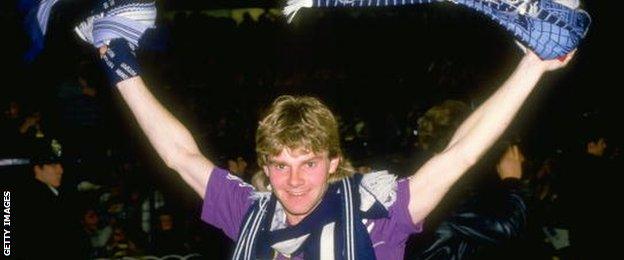
Ally Dick won the 1984 Uefa Cup with Tottenham and the 1987 Cup Winners' Cup with Ajax
Even in the immediate aftermath of the '82 Euros victory and a creditable run in the youth World Cup the following year, Roxburgh was already fearing this moment represented a high watermark rather than a precursor to more success.
"At that time we were really beginning to see the end of street football," he said. "Brazilian kids play with the ball all day long. In Scotland there was a history of that too, particularly through street football.
"The next thing was the opportunity to play. Schools football was a key. In the mid-1980s the teachers went on strike and I remember the schools FA telling me the numbers playing went from 45,000 to down to something like 10,000. It took them years to try to build it back up. I don't know if they ever did.
"I know in the '90s the idea of youth development academies, many of the top Scottish clubs didn't really embrace that. They learned later on that maybe they should."
A missed opportunity
Nevin agrees with Roxburgh - who he says was "ahead of the curve" in his coaching - that the decline of street football has mirrored the downturn in the Scottish national team's fortunes.
He also wonders whether Scotland missed an opportunity to build on the 1982 success, given the Dutch side they knocked out in the group stage featured several players - including Van Basten - who won the 1988 European Championship.
'Scotland missed an opportunity after 1982 success'
"I remember at the time thinking we were a good group and if some of us make it then that's good enough," said Nevin, who would go on to play for Chelsea and Everton and win 28 caps for Scotland.
"And then you look at what the Dutch did. They went miles ahead of where we went.
"A lot of us made it to the top level in England, in Scotland, and made it to international football, which is good. But we seemed to hit this ceiling at under-18s, under-21s. We used to get to the semi-finals and finals of top international tournaments then we hit this ceiling.
"I'm kind of saddened because we had a wee opportunity to push on a little bit further. But we qualified for Worlds Cups and Euros all through that period and maybe for the size of our nation, that's where we should have been."
- Published30 May 2017
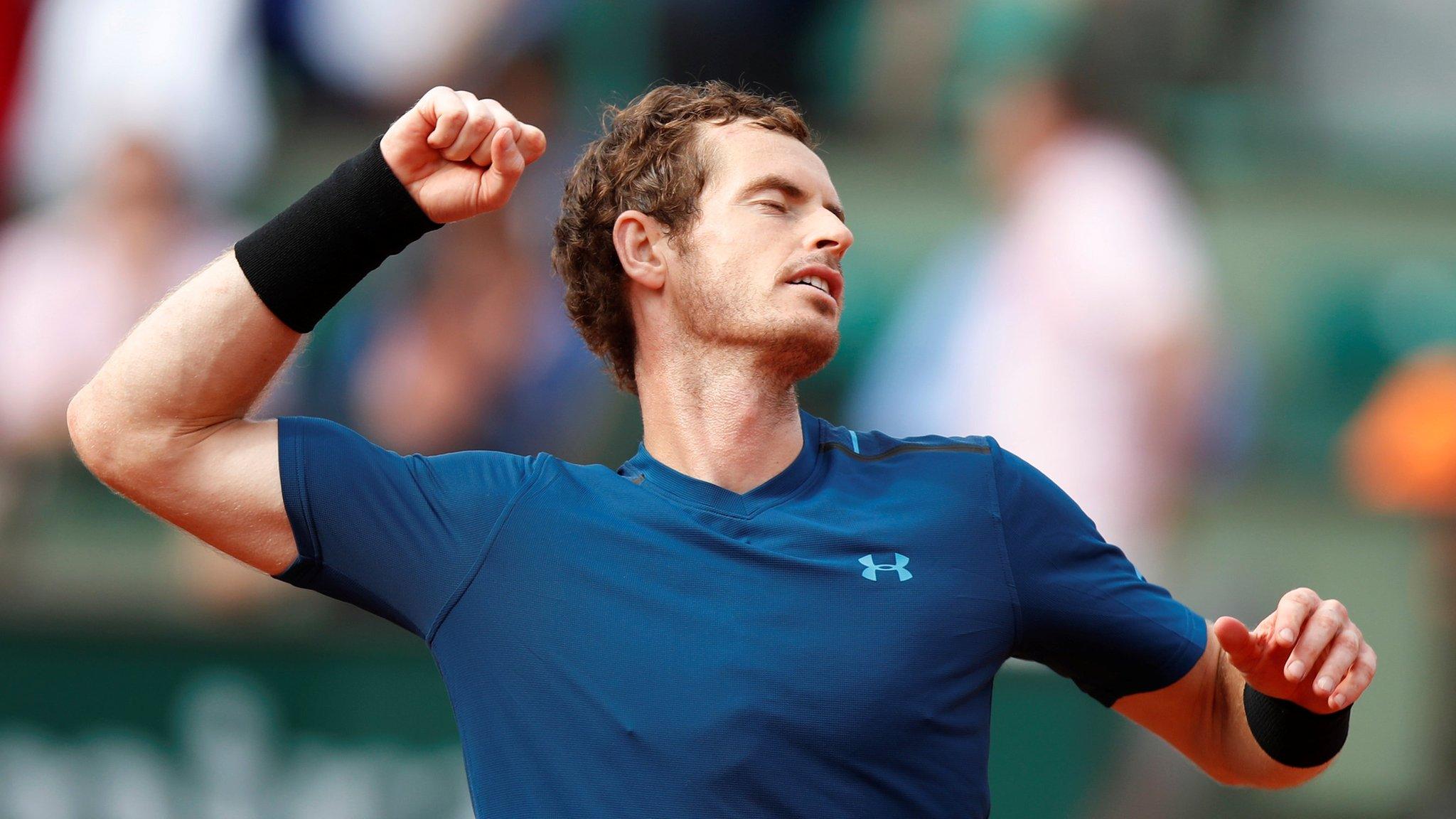
- Published29 May 2017
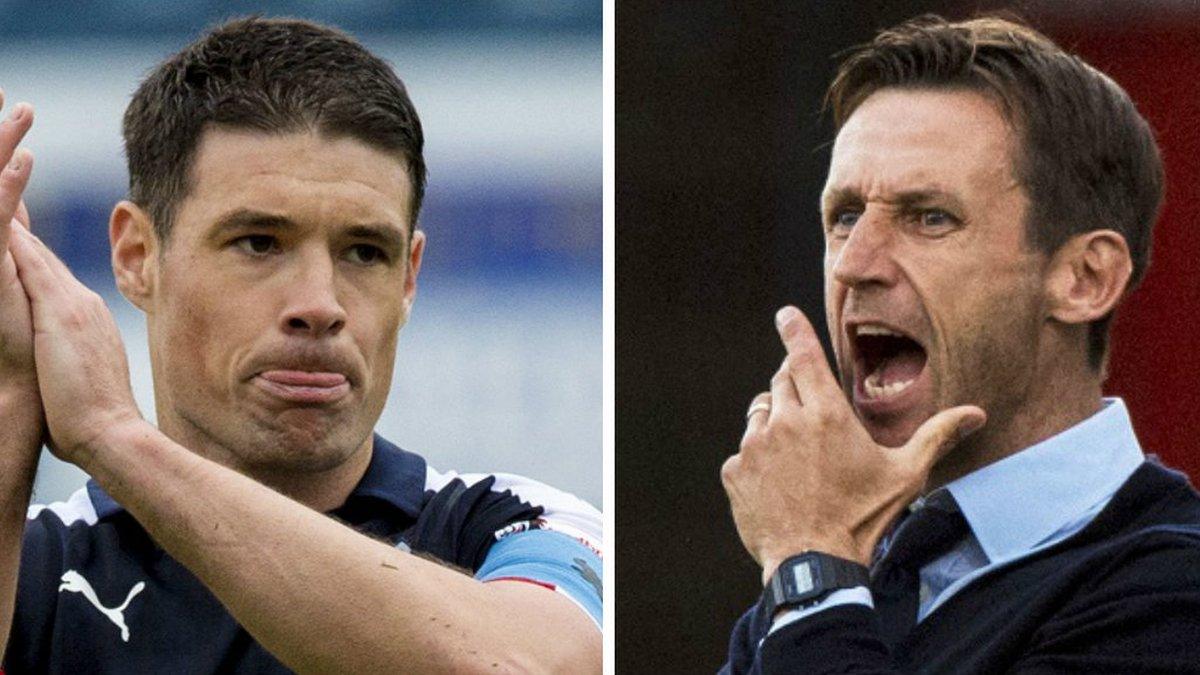
- Published29 May 2017
